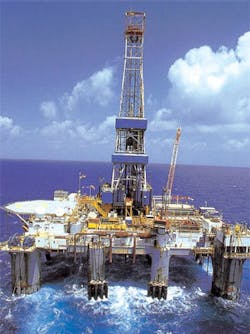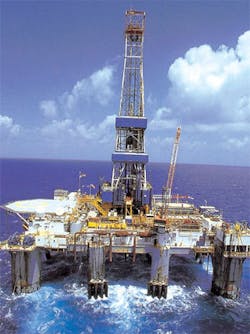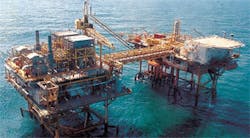Egypt’s deepwater potential: Deep offshore growth promises daunting challenges, but great rewards
Deep and ultra-deep waters around the world offer impressive potential as a source of oil and gas.
In a 2004 study of deep water petroleum potential, Wood Mackenzie Group concluded that total resources expected to be discovered in the world’s deep waters total 260 billion bbl of oil equivalent (boe). About 50 billion bbl of crude and 28 billion bbl of gas equivalent have been discovered to date; yet-to-find reserves of about 180 billion boe include 114 billion bbl of oil and 68 billion bbl of gas equivalent.
In 2004, oil and gas production from deep water accounted for about 5% of the world’s total, a share that is expected to reach 9% by 2010, according to Wood Mackenzie.
The challengestechnical and economicare daunting. But the rewards are enormous.
For one thing, the volume of oil or gas discovered by each deep water well is five times the reserves added by a similar well on shore or in shallow water, said the study.
An enviable position
Though still in the early stages of evaluating options and implementing plans, Egypt is poised to realize the potential of its deep water areas. Independent studies indicate gas production from deep offshore could play a major role in Egypt’s petroleum and petrochemical future.
The Wood Mackenzie study estimated future exploration in the deep water of the Mediterranean will add 70 tcf of gas reserves and 3 billion bbl of oil reserves to Egypt’s hydrocarbon storehouse. The study ranked Egypt’s deep water gas potential second in the world after the US Gulf of Mexico. If 70 tcf is indeed added, Egypt would have 18% of international deep water gas reserves.
The country’s exploration success coupled with the large size of discoveries promise to make the cost per equivalent barrel of its yetto- be-discovered reserves among the lowest, said the study.
To conduct the deep water study, Wood Mackenzie analyzed the potential of about 110 deep water reservoirs (below 400 m) in 30 sedimentary basins and river deltas in 18 countries.
A recent example of the promise of Egypt’s deep water regions is a discovery in the Mediterranean Deep Marine Area. Petroleum Minister Fahmy announced the discovery by Rashpetco in the West Delta Deep Marine (WDDM) concession 120 km offshore at a depth of 750 m. The well encountered natural gas zones as well as intervals containing large amounts of hydrocarbon liquids. Studies are underway to estimate reserves.
Just beginning
In addition to Egypt’s current proved gas reserves of 67 tcf, the consensus of international companies and consultants is that undiscovered gas resource is between 80 and 120 tcf.
“We trust we have not explored the whole economic zone in the Mediterranean yet,” said Mr. Karara. “And the extensive exploration campaign for deeper targets has not started in the Mediterranean.”
Most of the production now coming from the Mediterranean is from shallow structures. But recent discoveries by British Petroleum in north Alexandria and by Italy’s ENI in Port Fouad indicate deeper structures are present.
“It is evident that deeper structures will play an increasing role in future supply,” said Mr. Karara. “This makes Egypt a very good place for exploration for the next two or three decades.”
Future concessions will be for both onshore and offshore areas. But companies are particularly interested in offshore Mediterranean and onshore in the Nile Delta and northern parts of Sinai Peninsula, said Mr. Karara. Companies have already begun very aggressive exploration campaigns and are expected to continue despite the current challenge of securing the offshore rigs.
EGAS’s current pipeline network puts it in good position to begin to handle new production. The network currently transports about 6,000 MMscfd from current EGPC concessions. “We expect EGAS to start production from new concessions in the very near future after drilling begins this year,” said Mr. Karara.
With the expectation that much greater demand for deepwater facilities is on the horizon, Petrojet has begun to modify its platform designs and tool up its workshops to provide equipment for more severe operating conditions, according to Eng. Dahy, Chairman.
The conventional platforms that the company has been building are designed for water depths to 150 m. Last year the company fabricated and assembled a new record of 17,000 tons of offshore platforms in its Maadia yard in Alexandria. It has another yard at Zeit Bay north of Hurghada to serve Red Sea projects.
Offshore and sub sea capability
According to Eng. Eid, offshore projects especially those in Mediterranean waters to 2,000 mare the future of Egypt. Platforms can be installed economically in water depths to 100 m, and from 100 to 600 m, sub sea completions are an option. But beyond 600 m, high gas pressures call for more advanced technologies.
“Enppi has a long history of international cooperation,” said Eng. Eid. “During the last 30 years we have worked with almost every international company, depending on the project we were engaged in.”
As offshore exploration and development in Egypt expand, so does the need for an expanding array of marine services.
Petroleum Marine Services (PMS), an EGPC company founded in 2001, has expanded its capabilities and grown from a domestic pipe-laying and platform installation contractorwork it has done since 1980 as part of EGPCinto a competitive player that can provide a diverse range of offshore, sub sea and marine services.
“We are specialized in all aspects of offshore construction and installation from the engineering phase to final installation and pre-commissioning,” said a company official.
To comply with its vision to serve both local and international markets, PMS has been qualified by most of the international bodies whose certification is required for offshore work.
The first international PMS project, a successful job in Saudi Arabia, helped to establish the company’s reputation for quality work and innovation. Its unique approach to the installation of the Duba unloading facilities project for Saudi Aramco received industry attention and the appreciation of the client.
“It was a key project for the image and future of the company,” said a spokesman.
PMS is open to joint venture agreements with international companies to provide the needed technology and capacity to cope with new discoveries.
Diverse vessel fleet
PMS has a large fleet of marine vessels including two derrick lay barges, a derrick/hook up barge, two materials barges, two supply vessels, four tugs, three launches and a diving support vessel.
In mid 2004 PMS purchased the PMS Mayo, a dynamically positioned diving support vessel equipped for saturation diving in water depths to 300 m. With two diving bells and 16 divers working at same time, it can work around the clock. PMS Mayo is one of the largest such vessels in the world.
PMS also has expanded its ROV and geophysical survey businesses. And it is performing intervention work, an important service in Egypt today, and one that will be increasingly important as deep water development and production expand.
The company is working in the Scarab/Saffron and Simian/Saffair fields where water depths are about 1000 m. These operations use an ROV rather than saturation diving, but both can be supported by the dynamically positioned vessel.
A full service provider
Developing Egypt’s undiscovered oil and gas reserves will require a broad range of technologies and services. Over more than two decades, Pico Energy has developed into a service leader, providing comprehensive upstream and downstream services and products.
At first, Pico operated under licenses, but added new services until now it works through strategic alliances with two major oilfield service companies, Halliburton Energy Services and Weatherford International. It also offers its own services and operates a machine shop. Pico Petroleum Services today is ISO certified and its workshops are American Petroleum Institute (API) approved.
These alliances bring a number of benefits to Pico, including the ability to standardize its services to better serve its multinational customers.
“Technological transfers are very important to us,” said Mr. Sherif Abdel Wadood, Managing Director of Pico Group. “Blending foreign technical know how, local knowledge and local content is essential.”
An example of Pico’s innovative approach is its risk sharing and payment terms that matched cash flow requirements for Centurion Energy’s work in its El Manzala concession. And recently, it implemented a lump sum contract approach with Offshore Shukheir Oil Co. that allowed the operator to complete drilling ahead of schedule and reduce well costs.


